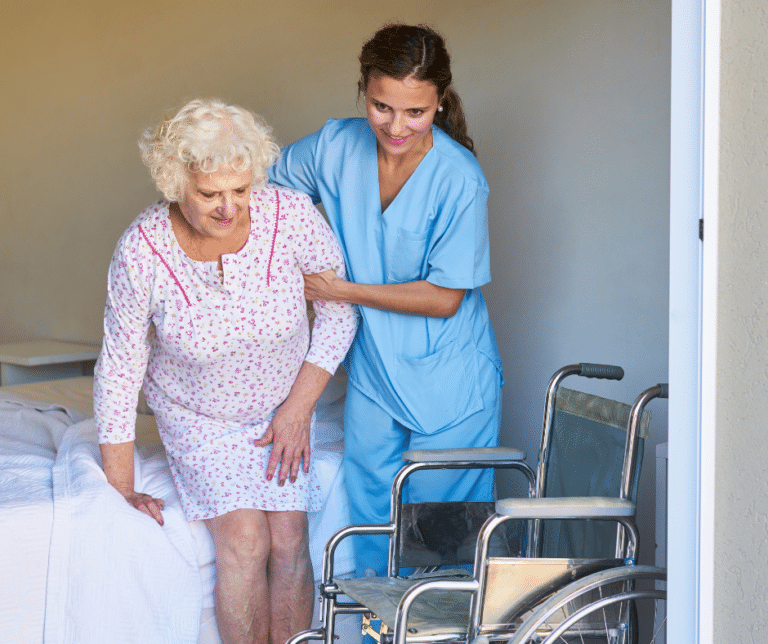If your senior parent has very poor mobility due to illness, injury, or a medical event like a stroke they will need to be transferred safely in and out of bed, from bed to a chair, or even into the bathroom to use the bathroom and shower. They may also need to be transferred out of bed to be dressed each day.
Transferring a senior parent can be physically and emotionally difficult. Often, children find it awkward to try and transfer a senior parent. And if your senior parent is much bigger than you it can also be dangerous for you and for them.
If your senior parent needs transferring, you should consider getting personal care at home for them. The caregivers who specialize in personal care at home have training that helps them transfer seniors of all shapes, sizes, and abilities safely. With personal care at home seniors also get safe and experienced help with tasks like showering and getting dressed.
If you are trying to transfer your mom or dad safely use these tips to make it easier and safer for both you and your mom or dad:
Get Ready
When you’re getting ready to transfer your mom or dad make sure that the chair, wheelchair, shower bench, or wherever you are transferring them to is ready. If you’re transferring them from the couch or a chair to bed make sure the bed is made and the blankets are pulled down and not in the way. Taking a few minutes to prepare will save you and your mom or dad a lot of hassle later on.
Use All Available Equipment
There are many different pieces of equipment that can help you transfer your mom or dad. Slings, slide boards, transfer belts, and mechanical lifts are all available to make the transfer easier. Just make sure that you know how to safely use each piece of equipment and that the equipment is appropriate for your mom or dad.
Communicate With Your Mom or Dad
Tell your senior parent what you’re going to do before you do it, so they have an idea of what is coming. Communicating your movements in advance also gives them time to move their body as much as they can to help.
For example, if you let your dad know that you’re going to be moving his left leg he can do as much as he can to lift it while you lift it, making the transfer easier.
Safety First
Safety is the most important part of transferring. You and your senior parent could both get seriously hurt if you drop them, don’t have a stable base, or don’t take the right precautions during the transfer. If you are feeling unstable or think that you won’t be able to complete the transfer then don’t start it. Wait for help.
Get Professional Help
Remember that personal care at home is always available. Getting help from a professional caregiver who has training and experience helping seniors transfer is a good way to make sure that you and your senior parent don’t get hurt.
If you or an aging loved one are considering Personal Care at Home in Reston, VA, please contact the caring staff at Access Home Care Inc today! Call (703) 765-9350
Access Home Care provider in Arlington, Alexandria, Leesburg, Reston, Herndon, Manassas, Ashburn, Falls Church, McLean, Lorton, Springfield, Woodbridge, Fairfax, Virginia and the surrounding communities.
“My desire to enter into nursing started when one of my older sisters died of kidney disease due to lack of care. At age 15, I decided to enter into nursing so that I could provide quality care to patients.Upon arrival in United States at 21 years of age, I enrolled in T.C Willliams School of Practical Nursing while working as a nursing assistant at a nursing home. I also worked as a part-time home health aide to take of the elderly. After completion of my practical nurse education, I worked in geriatric psychiatry unit at Dominion Hospital and Arlington Correctional facility mental health unit.
I completed Marymount University in 2001 and entered into Home Care as a field case manager.
I held that position for 2 years and as an Administrator, and for another 2 years until Access Home Care was found in 2004."
Today, Access Home Care has over 300 employees and 286 clients.
- Five Tips for Living with Chronic Lower Back Pain - April 3, 2025
- How 24-Hour Home Care Is Different From Other Types Of Care - March 19, 2025
- Four Symptoms of Advanced Multiple Sclerosis - March 5, 2025



